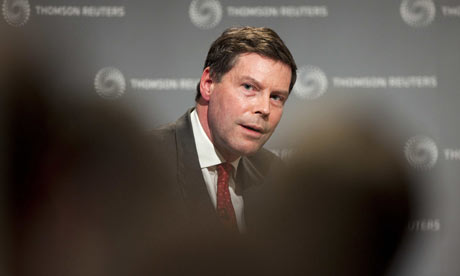Top bankers could face veto, says head of Financial Services Authority
• Bank bosses who run business unethically may be barred
• Hector Sants attacks Conservative plans to disband regulator
The City regulator today waded into the debate over the Tobin tax on transactions and warned the City that the appointment of top bankers could be vetoed if their approach to business is not ethical.
Hector Sants, chief executive of the Financial Services Authority, also appeared to hit back at critics who want to change the way the City is regulated, particularly the Conservatives, who want to disband the FSA. He said dividing up regulation would mark a return to the "dark ages".

Hector Sants, FSA chief executive, defended the disciplinary powers of the City regulator. Photograph: Kevin Coombs/Reuters
As he made his call for cultural change and for the City to take "collective responsibility" for the crisis, Sants also outlined a tough line on bonuses. He said the regulator would ensure that banks did not channel profits into bonus pools that should otherwise be used to bolster capital cushions.
He said the debate about a Tobin tax, reopened by Gordon Brown at the G20 meeting over the weekend, should kickstart a debate about whether "excess profits" were being made by City firms and how to fund a pool of "contingent capital" in the event a firm collapses.
Lord Turner, FSA chairman, was the first senior figure to legitimise the debate about the tax on transactions that could be used to control City behaviour and finance a bail out fund. Sants said: "We do think there is a competition question to be asked about whether we are seeing undue concentration" in some ares of the City.
He made it clear the regulator did not believe the City had acknowledged the errors that caused the banking meltdown. Firms which do not adjust their behaviour will face tough action from the FSA. "And yes, that does mean people go to jail," he said.
Sants said: "It is important to recognise that the FSA will not presume that the firms we supervise have learned the lessons of the past. There remains, I believe, an absence of the acceptance of collective responsibility for what has happened.
"I personally remain unconvinced that all senior management have taken on board the need to change and operate in a genuinely different manner.
"We recognise that culture is driven by individuals and in particular senior executives who set the tone from the top. I thus strongly believe that our authorisation regime should seek to make a determination of an executive's ability to set a strong ethical framework and to foster the right culture."
The FSA has already said it intends to analyse the probity of top executives along side their competence, the traditional test it used to authorise senior banking executives. Yesterday, Sants said an additional element would be introduced to gauge how mangers would set the culture of their organisations. The subject will be debated further in a discussion paper due shortly.
Since the onset of the banking crisis, 19 candidates out of 172 have withdrawn their applications following scrutiny by the regulator.
He also said the FSA had stopped some entrants from setting up savings accounts and, because of concerns about financial strength, has forced some firms to cut their rates to ensure they are not in "best buy" tables.
He set out a case for why the FSA should survive in structure if not in name. "Society must not lose the benefits of the tough, hard learning experience the FSA has been through. Furthermore, I observe that truly effective institutions are built on strong cultures, and that strong cultures need time and experience to evolve."
No comments:
Post a Comment